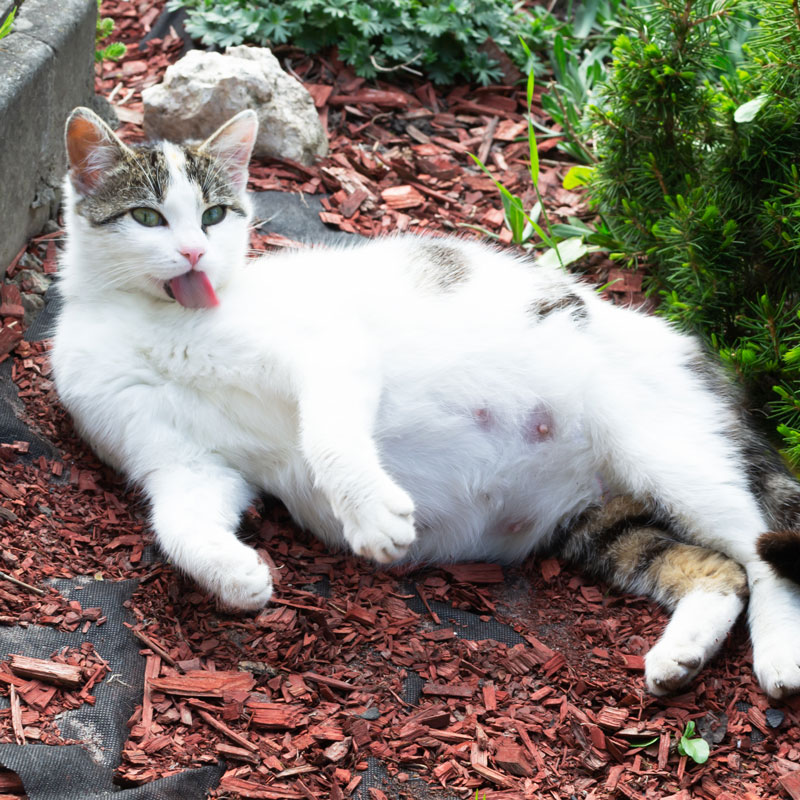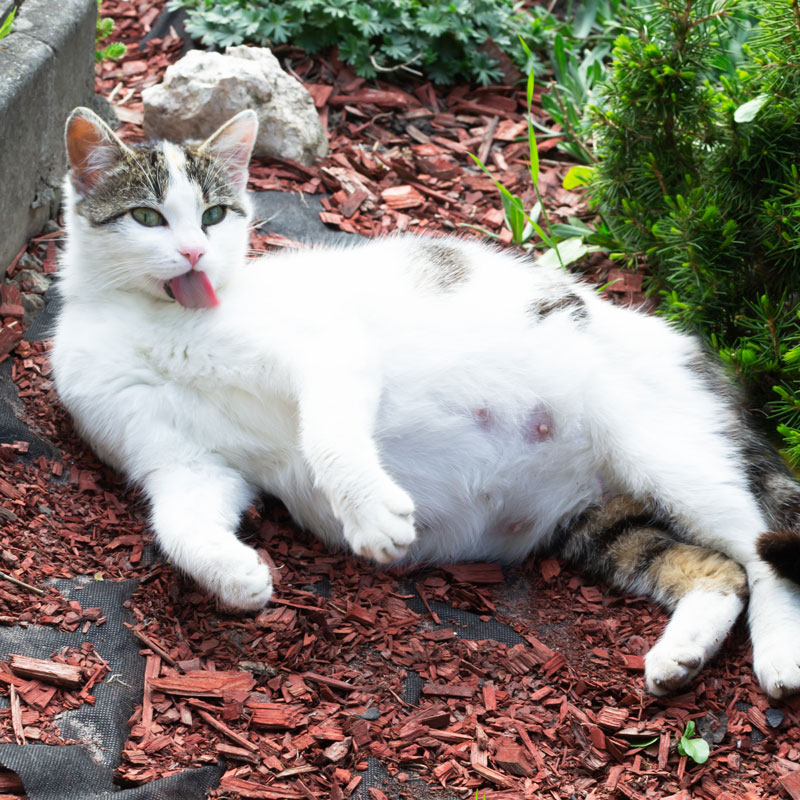A cat is pregnant for approximately 63 to 65 days. Cats have captivated humans with their mysterious and independent nature for centuries.
Whether you’re a cat owner or simply curious about feline reproduction, understanding the gestation period is crucial. Cats have a relatively short pregnancy compared to other animals, lasting an average of 9 weeks. During this time, a remarkable series of transformations occur within the cat’s body, leading to the birth of adorable newborn kittens.
From the moment of conception to the final stages of pregnancy, a cat’s journey is filled with anticipation and wonder. We will explore how long a cat is pregnant, providing you with valuable insights into this remarkable process.
Understanding Feline Gestation
Cat pregnancy, also known as feline gestation, lasts for an average duration. Several factors influence its length.
The Stages Of Cat Pregnancy
Cat pregnancy lasts approximately 63 to 65 days. During stage 1, early signs and symptoms such as increased appetite and behavior changes may be observed. By stage 2, the cat’s body undergoes mid-term development, and physical changes become more pronounced.
The growing kittens can be felt through gentle palpation. In the final stage, around 2 weeks before birth, the cat starts to prepare for delivery. Nesting behaviors like searching for a suitable location and creating a birthing area become noticeable.
It’s important to provide a quiet and comfortable space for the cat during this time. Understanding the stages of cat pregnancy helps owners anticipate and accommodate their feline’s needs throughout this remarkable journey.
Monitoring And Caring For A Pregnant Cat
A pregnant cat’s gestation period typically lasts between 63-65 days, though it can vary. During this time, it is crucial to monitor and care for the expecting feline. Veterinary visits are essential during pregnancy to ensure the cat’s health and identify any potential complications.
Additionally, paying attention to the cat’s nutritional needs is vital. Providing a balanced diet with appropriate dietary considerations will support the mother cat and her developing kittens. Exercise and stimulation are also important for pregnant cats to maintain their physical and mental well-being.
Encouraging moderate activity and engaging playtime can help keep them active and happy. By being attentive to these factors, you can contribute to the overall health and well-being of your pregnant cat.

Credit: www.communitycatspodcast.com
Recognizing Impending Labor In Cats
Cat pregnancy typically lasts between 58 to 67 days, with an average gestation period of around 63 days. It is crucial for cat owners to recognize the signs that labor is approaching. Some common indicators include restlessness, increased vocalization, nesting behavior, and a decrease in appetite.
Additionally, you may notice a thinning and reddening of the vulva, as well as a milky discharge from the nipples. These physical changes are cues that the birth of kittens is imminent. To prepare for the upcoming labor, create a quiet and comfortable area where your cat can give birth.
Provide a cozy nesting box lined with blankets or towels and ensure it is easily accessible for your feline companion. Monitoring your cat closely and being aware of these signs will help you anticipate the arrival of the adorable new additions to your household.
Birth And Postnatal Care For Mother And Kittens
Cats are pregnant for an average of 63 to 65 days. During labor, which is called parturition, the mother cat may exhibit several signs, such as restlessness, nesting behavior, and panting. The first stage of labor usually involves the mother cat leaking a watery fluid and experiencing mild contractions.
This stage can last up to 24 hours, during which the mother may seem anxious or seek a quiet place to give birth. The second stage of labor involves the actual delivery of the kittens. The mother will likely pant, vocalize, and push to expel each kitten.
Kittens are typically born every 10 to 60 minutes, and the entire process can take from one to six hours. After the birth, the mother will sever the umbilical cord and clean each kitten, stimulating them to breathe and eliminating any birth fluids.
It is crucial to provide proper postnatal care to ensure the health and well-being of both mother and kittens. This includes monitoring the mother’s behavior, ensuring a clean and warm environment, and ensuring that the kittens are nursing and gaining weight properly.
Common Concerns And Complications
Understanding potential complications during feline pregnancy is crucial. While cats typically have a gestation period of around 63-65 days, complications can arise. One common concern is the onset of labor, which may not occur within the expected time frame. If a cat goes beyond 70 days without giving birth, it’s important to seek veterinary assistance.
Another complication is dystocia, where the cat experiences difficulty during labor. Signs of dystocia include prolonged contractions or straining without delivering kittens. In such cases, immediate veterinary attention is necessary to prevent harm to the mother and kittens. Other potential complications include stillborn or weak kittens, as well as postpartum complications such as mastitis or retained placentas.
Recognizing these issues and seeking veterinary assistance promptly can help ensure the health and wellbeing of both the mother cat and her kittens.
Post-Pregnancy Recovery And Care
A mother cat’s post-pregnancy recovery and care are crucial for her overall well-being. After giving birth, it is essential to provide the necessary vaccinations and consider spaying. Supporting the mother cat in her recuperation process is vital for her health and the health of her kittens.
By keeping up with the recommended vaccinations, the mother cat can ensure the prevention of any potential diseases or infections. Spaying after giving birth can help control the cat population and contribute to the overall welfare of cats. Providing a safe and comfortable environment, along with proper nutrition and rest, is also key to helping the mother cat recover.
Taking these steps will ensure the mother cat’s post-pregnancy period is as smooth and healthy as possible.
Frequently Asked Questions Of How Long Is A Cat Pregnant
How Long Is A Cat Pregnant?
A cat’s pregnancy typically lasts around 63-65 days. It is important to note that this can vary slightly depending on the breed and individual cat. During this time, the cat will undergo significant physical and hormonal changes as her body prepares for the arrival of kittens.
Conclusion
To sum up, understanding the length of a cat’s pregnancy is essential for any cat owner. The average gestation period for cats is 63 to 65 days, but every cat is unique and may have variations in their pregnancy duration.
It is crucial to monitor your cat during this time, ensuring she receives proper nutrition and healthcare. As a responsible owner, you should be prepared for the arrival of kittens by creating a safe and comfortable space for them. Keep in mind that cats can go through stages of false pregnancy or have small litters, so pay attention to any unusual behaviors or health issues.
By staying informed and seeking veterinary guidance, you can ensure a healthy, successful pregnancy for your feline friend. Remember to provide love, support, and care throughout this incredible journey as your cat embarks on motherhood.



